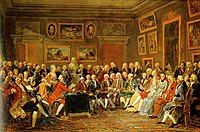
Photo from wikipedia
Interdisciplinarity promises much. It feels intuitively true that talented and knowledgeable people from different disciplines should be able to work together in supra-disciplinary ways that produce new insights on topics… Click to show full abstract
Interdisciplinarity promises much. It feels intuitively true that talented and knowledgeable people from different disciplines should be able to work together in supra-disciplinary ways that produce new insights on topics of shared interest beyond what the separate disciplines on their own could achieve. This intuition feels especially true as we live through the academic discipline of history’s current version of a ‘global turn’, with all its expectations of multifacetedness. The Eighteenth Centuries is inspired by such optimistic ambitions. It offers twelve essays divided into four broadly thematically-coherently Parts, brings together scholars from a variety of fields and aims at an exemplary interdisciplinarity going beyond the ‘silos’ (3) of our narrow academic disciplines. The essays ‘while looking in different directions, at different objects... at the same time contribute to our understanding of the interconnectedness of the “eighteenth centuries”’ (5). The disciplines present are variants or cousins of history – e.g. cultural, architectural, information, literary, the history of music and the history of art – and it is this more limited version of interdisciplinarity in which several of the individual essays excel. The three essays in Part I deal with the themes of knowledge production and circulation. Brad Pasanek and Chad Wellmon examine Kant’s ‘What is Enlightenment?’ essay in terms of its place within a debate in mid-1780s Prussia in which contributors were aware not only of their participation but construction of a process of ‘enlightenment’. While the chapter would have benefitted from being embedded in historiography on the republic of letters and European citation practices, it does offer some thought-provoking commentary on how the footnoting of the Berlinische Monatsschrift framed Prussian enlightened debate. Their use of network analysis helps flesh out this point. Michael Pickard’s short and primarily suggestive essay explores the content and potential historical significance of Edinburgh printer William Strahan’s business ledgers. The suggestions of these two essays, that we need to pay attention to the social history of knowledge (cf. Darnton, 1971), will hardly set the world alight. Patricia Meyer Spacks’ contribution is an exploration of multi-talented Eliza Haywood’s novel The Fortunate Foundlings (1744), and its use of real-world events in her fiction. The more immediately stimulating material, however, is Spacks’ digression into discussing her personal experiences of interdisciplinary studies, including their failings. Such endeavours require shared goals and, broadly speaking, either shared or overlapping standards of evidence – otherwise there are untraversable ‘chasms’ separating disciplines (64). Part II also has three essays, relating to the history of breeding. In one of several highlights of the collection, Ruth Hill develops the thesis that in the Americas ‘equations for breeding white persons’ originated in earlier understandings about ‘degeneration in brutes... and plants’ (73–74). The use of contemporary anthropology, Hill’s gesture at interdisciplinarity, serves little purpose other than adding an extra level of clouding jargon. Carrie B. Douglass’ innovative chapter examines the trading of horses amongst elite early American Virginia families to explore the social character of plantation society. Interestingly, horse-trading involved establishing debt-relationships in which social ties rather than quick repayment
Journal Title: Global Intellectual History
Year Published: 2019
Link to full text (if available)
Share on Social Media: Sign Up to like & get
recommendations!